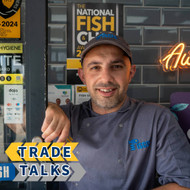Leading Through the Crisis: The Battle for Talent in Hospitality
Posted by Cos Michael on 10th Jul 2025 Reading Time:
Welcome to this edition of Trade Talks, where we bring you insights straight from the fryers of the fish and chip industry. In this column, Cos Michael, Owner of Pisces in Heswall, shares his perspective on the trade.
Recruitment. Retention. Resilience.
These are no longer just operational concerns in the hospitality industry — they’ve become daily battles.
For independent business owners like myself, the challenge isn’t just in running a kitchen or satisfying customers; it’s also about managing the business itself. It’s in finding, inspiring, and keeping the people who make it all work.
Over the years, the hospitality industry has faced waves of change, but none more disruptive than what we’re experiencing now. And the truth is, if we don’t address the way we lead and look after our teams, we’ll find ourselves working harder for worse results — and wondering why we can’t retain good people.
Experience vs. Attitude: Who Are You Hiring?
One of the most critical decisions I face repeatedly is whether to hire someone for their skills or character.
Hiring someone experienced is tempting. They can hit the ground running. But sometimes, experience comes with ego or baggage. On the other hand, bringing in someone with no background but loads of energy gives you a chance to shape them — if you’ve got the leadership to do it.
The real question is: what kind of business do you want to be?
I’ve seen young starters with no CV turn into team leaders within a year just because someone took the time to mentor them. I’ve also seen people with decades of experience cause more damage than good because they thought they were above improvement.
So which is right?
The truth is, both approaches work — if you lead them right.
The Human Side of Leadership
Regardless of how skilled someone appears to be on paper, they’re still a human being. What they need most is a leader who takes time to understand them. Not just a boss who sets rotas but a mentor who sets standards and helps people reach them.
Great leadership in hospitality means:
- Clarity – Clear expectations, clearly communicated.
- Consistency – Rules always apply equally to everyone.
- Compassion – Taking time to understand why someone might be struggling.
- Culture – Building a team that supports one another through hard shifts and long hours.
Here’s a real example we’ve seen:
“We once had a 17-year-old walk in, nervous and barely able to maintain eye contact. No experience, no CV. But she was warm, curious, and eager. Within six months, she was our most reliable team member. She now trains new starters. All because someone gave her a shot and showed her how to succeed.”
Now flip that:
“We also had a ‘veteran/so-called experienced member’ who came in with big promises. However, they cut corners, believing they always knew better, but had picked up bad habits that were never challenged and refused to adapt to our way of working. Eventually, we had to let them go. Experience alone isn’t enough.”
What Makes a Good Hospitality Leader Today?
A great leader today isn’t just tough. They’re present. They notice when someone is off. They catch people doing things right, not just wrong. They recognise effort — not just results. They model the standards they expect.
And most importantly, they make the workplace feel like a shared mission, not just a job.
Leadership isn’t a power trip — it’s a people skill.
Let’s Share What Works — And What Doesn’t
This industry gets stronger when we’re honest with one another. So here are some lessons we’ve learned the hard way:
What’s Worked:
- Giving new starters a ‘mentor shift’ where they shadow someone who loves the job.
- Creating a team WhatsApp group just for good news, praise and photos.
- Involving the team in decisions — like choosing the next menu special or charity fundraiser.
What Hasn’t Worked:
- Ignoring underperformance and hoping it’ll fix itself.
- Piling pressure on reliable staff instead of addressing weak links.
- Allowing toxic behaviour to stay just because someone is “fast” or “experienced”.
The Myth of “I Don’t Have Time”
In small businesses, especially in hospitality, one or two people often wear every hat: director, buyer, trainer, cleaner, bookkeeper — you name it.
So when we say things like:
- “We don’t have time for team training.”
- “We’re too busy to run leadership development.”
- “We can’t stop for team bonding…”
…it’s usually true. But here’s the flip side:
If you don’t make time to lead well, you’ll always be stuck firefighting.
A lot of businesses don’t struggle with hiring — they struggle with what happens after someone is hired.
Many owners think:
“This person seems great… now let’s hope they can figure it out.”
But good teams aren’t built on hope. They’re built on leadership — and leadership can be taught.
Some people naturally inspire others. They lead with empathy, clarity, and energy. But many don’t realise they have that potential or simply don’t know how to use it. That’s where training your leaders matters — even if they’re not ‘managers’ on paper.
Even 20 minutes a week to sit down with your team and ask:
- “What’s going well?”
- “Where are we struggling?”
- “How can I support you better?”
Builds loyalty, strength, and trust far more than a £1-per-hour pay rise ever will.
Great businesses don’t find the time — they make the time.
Understanding the New Generation
One of the biggest truths in hospitality today is this:
The next generation doesn’t think like we did 20 years ago.
It’s not laziness. It’s not entitlement. It’s change.
Young people have grown up with instant feedback, fast information, flexible working and (especially post-Covid) a completely different view of work/life balance.
If we keep trying to lead them the old way — with command, control, and clock-watching — we’ll lose them.
Instead, we need to connect with:
- Purpose
- Respect
- Progression
- Flexibility
Covid Changed Everything
We can’t discuss recruitment and retention without acknowledging the impact of COVID-19.
It changed how people see life. It made people prioritise time, health, and purpose. It showed millions of workers that they could live differently. That mindset hasn’t gone away.
So if hospitality businesses want people back — or want to keep them — we need to adapt to how people think now.
That doesn’t mean giving up standards or becoming soft. It means building workplaces people want to stay in.
The Self-Inflicted Wound: When You Don’t Value Staff Until It’s Too Late
As business owners, we’re always measuring profit. But good business isn’t just about chasing margin — it’s about understanding value.
And lately, value is harder to manage, especially when recruitment agencies are involved.
The Agency Dilemma: Pay More, Control Less
Whether you like them or not, agencies have become part of the hospitality hiring process. Need someone fast? They’re often your only option.
But there’s a trade-off:
Agencies increase your cost per hire — often dramatically.
Take this real example:
A head chef was working directly for a business at a fair rate. He left. Later, the same business rehired him through an agency — at 2.5 times the original wage.
Same job. Same person. Less control. Higher cost.
The issue? They didn’t value him until he was gone.
The Cost of Inaction
We often say things like:
- “We can’t break our pay structure for one person.”
- “It sets a bad precedent.”
- “That’s not how we run things.”
But sometimes, sticking to the structure is what costs you your best people.
If someone is delivering undeniable value, weigh that against your principles — or you’ll lose them and pay twice as much to replace them.
Business Decisions vs. Business Egos
Saying “no” can feel like protecting the business. But saying “yes” — when it’s fair — can be the most innovative business move you ever make.
The key question is:
Is this person worth more than they cost?
If yes — act before someone else does.
Beyond Wages: What Keeps People?
Yes, hourly rates and minimum wage matter — especially with the rise in the minimum wage for under-21 workers.
But here’s the thing:
If someone can earn more scanning groceries in peace than sweating it out in a high-pressure kitchen, why wouldn’t they?
So what’s your offer beyond the money?
People stay for:
- Clear progression
- Positive team culture
- Recognition and respect
- Opportunities to grow
Not everyone wants to be rich — but most want to feel part of something that matters.
Final Word: Are You Managing Tasks or Leading People?
Hospitality is hard. But people make it bearable — and brilliant.
So ask yourself:
- Are we creating jobs or building teams?
- Are we solving problems or avoiding them?
- Are we paying people to show up or inspiring them to stay?
Recruitment and retention aren’t tasks — they’re the heartbeat of your business.
If we lead better, we build better. And if we build better, we all win.
Challenge: Start Leading Today
Pick one team member this week. Sit down with them for just 15 minutes and ask:
- What’s going well?
- What’s been tough lately?
- How can I support you better?
Do it weekly with someone new.
It’s 15 minutes — but it could change everything.
Did you enjoy this Trade Talks column? Have industry insights or thoughts to share? We'd love to hear from you! Drop us a line at info@worldofceres.com.








